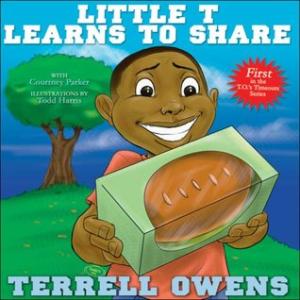Sharing might be caring, but leave some room for independence.

I'm kind of wondering how much Terrell Owens actually wrote, because there's a ghostwriter for this: Courtney Parker. Anyhow, it's kind of sort of written in poetry, but it's not very well-written poetry and the rhymes are forced, if they're there at all. "No fun at all" does not rhyme with "play football." The accents are wrong. That's not poetry anymore.
The main character is Little T, who I'm guessing is based on Terrell as a kid. He is playing outside with a football, and his friends come over and say, "Hey, we want to play too." And he says, "Um, well, I just got this football and it's all shiny and I'm not ready to share it yet. Maybe in a couple days, that'd be okay." Which I think is a perfectly legitimate response, you know. "Let me enjoy playing with it by myself, that's what I feel like doing right now, and come back in a couple days. I will totally share with you then."
And they get mad and say, "That's not fair, it'll be old by then." And he says, "You know, it's my ball. I get to make the rules." They're upset by that, and he goes home and sits out in the backyard and realizes that he apparently can't play with the football by himself despite the fact that that's what he was doing at the very beginning. It's no fun to play football by yourself. I wouldn't imagine it'd be much fun to play with only three people either.
Then his mom sees that he's sad (she's washing the dishes of course, you know, female work) and asks him what the matter is. He starts to cry and says, "I didn't share my ball and I'm sad and I regret doing that." And it says that she agreed with him that he'd been wrong and needed to take a time out. I'm not sure what that timeout was, because she doesn't actually like make him sit in the corner or anything. Is she referring to the time he took sitting by himself before realizing that he needed other people to play football? Was that the time out? Or is she literally punishing him for making a decision and then regretting the decision? And she says, "You've learned a valuable lesson about always being fair." It's important not to not be selfish, and to always try to share." Ugh.
Then he's worried that his friends won't forgive him, and he tells them, "You know what, I'm sorry I was unfair. I want to play with you." And they say, "Okay," and then they play with the football. And that's it. So not only is it not a fascinating story, but only a thing that happened to somebody and then they changed their mind about because they were bored and lonely, I don't think this really sets a good example for children. It's not a bad idea to try to share when you can, but I think it's important that children understand that they don't have to share. You can't force children to share and it's really not fair to try to do that. They need to have some possessions that they can exert control over, just like you wouldn't force them to share their food with someone. They have to get something out of it. Either there has to be some kind of intrinsic motivation or actual reward to sharing. Now, if something doesn't belong to the child alone, but belongs to multiple people, then sharing can be required of them. Sharing should also be suggested as a way of involving a larger group: you cannot play with a group and yet not share something.
So that's really what this boils down to, is not understanding what sharing is. I have two children, and the oldest (now a preschooler) went through a lot of trouble trying to learn how to share with his younger brother. He still has not quite figured it out 100%. But he does have things which are totally his property and that he has control over, like his favorite stuffed animal. I'm not going to force him to share that. It's his. His brother has his own stuffed animals; he can go get them. If he's playing with something and and his little brother comes up and tries to take it, I'm not gonna make him share it. I might suggest it, but it's just like if his little brother was playing with something and he came up and took it. That's not okay. I'm not going to tell him at that point that he needs to learn to share.
If he is the sole owner of something (which is not that common around our house as pretty much everything is communal) I certainly don't force him to share those, in the same way that I don't force him to hug and kiss people if he doesn't want to. It's his stuff. It's his property. He needs to feel like he has some control over his life.
The good part of the book is that Little T comes to the understanding on his own, and that nobody lectures him about sharing (well, until after he's decided it on his own). He realizes that he made a mistake, he goes back and rectifies the problem, and the reason that he starts to share is because he realizes that's what he wanted to do all along. But framing it as, "You need to always share every moment of the day," is just ridiculous. It's not going to work, either.